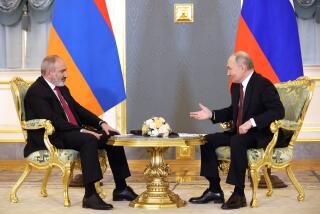Gorbachev Home to New Woes : Bloodshed, Political Foe Await Him
- Share via
MOSCOW — Mikhail S. Gorbachev returned from the United States today triumphantly bearing trade and arms deals but facing ethnic bloodshed in Central Asia, an impasse with the Baltic republics and trouble in the Kremlin.
In Gorbachev’s absence, his nemesis Boris N. Yeltsin was elected president of Russia, the largest Soviet republic. Yeltsin immediately called for the resignation of the Soviet Cabinet and a new constitution that would vastly reduce the powers of the central government.
In the distant reaches of Soviet Central Asia, two Turkic groups clashed today for the second day along the border between Uzbekistan and Kirghizia. Authorities declared a state of emergency and said 11 people were killed.
Houses and cars were burned and more than 200 people were reported injured in the clashes between Uzbeks and Kirghiz in Osh, a Kirghizian city on the border with Uzbekistan.
The fighting began Monday over a land dispute between the two predominantly Muslim ethnic groups. Soviet troops were unable to control the situation.
Battles continued today between groups numbering between 200 and 600, the Interfax news agency reported. It said among the dead were a master sergeant of the Interior Ministry troops and a police cadet.
Along the Baltic coast, Prime Minister Kazimiera Prunskiene of the secessionist republic of Lithuania reassured her compatriots that American sympathizers will try to block Congress from endorsing a U.S.-Soviet trade deal signed at the summit.
And within the ancient red brick walls of the Kremlin, the Supreme Soviet legislature unexpectedly postponed consideration of the emigration law that President Bush set as a precondition for implementing the trade pact.
It was not clear whether the postponement was instigated by Gorbachev, who warned Sunday that he might curb emigration of Soviet Jews if they continue to settle on lands occupied by Israel during the 1967 Mideast War.
The trade deal, which drew immediate criticism from members of the U.S. Congress, was an unexpected summit triumph for the Soviet president.
Bush had said previously he would not sign the agreement until Gorbachev lifted the economic sanctions he imposed against Lithuania after it declared independence March 11. American lawmakers chided Bush for stretching too far to help Gorbachev, who has left the sanctions in place and refused to negotiate with Lithuanians until they suspend their declaration.
The Soviet leader has also decreed that the two other Baltic republics, Estonia and Latvia, violated the Soviet Constitution by taking less bold steps toward independence, but he has not been able to bring them back into the fold.
State-run Soviet television and centrally published newspapers gave blanket coverage to Gorbachev’s trip, hailing the agreements he signed to eliminate superpower chemical weapons and complete a treaty to slash long-range nuclear arsenals.
The official media also stressed Gorbachev’s personal rapport with Bush and with the crowds of Americans who cheered and applauded the Soviet leader at every stop.
More to Read
Sign up for Essential California
The most important California stories and recommendations in your inbox every morning.
You may occasionally receive promotional content from the Los Angeles Times.










